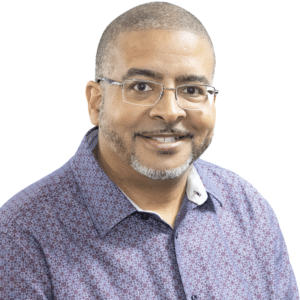One of the movies that I watched as a teenager growing up in the ‘80s was Bill Murray and Dan Aykroyd’s Ghostbusters. When the city was in trouble and being taken over by evil, darkness, and despair the citizens looked for someone to rescue and deliver them from the menacing spirits that besieged the city. The cry echoed in the streets was, “Who you gonna call?” And the enthusiastic response was “Ghostbusters!”
Today, there is a resounding cry bellowing in the streets for someone to address the pain, hurt, injustice, and anxiety across America. The world around us is seeking for someone or some organization to provide answers, heal brokenness, and repair the fractures that threaten us all. When the world cries out for help, my prayer is that they will seek deliverance from Christ and His church.
While the world turns to hear the collective voices of the NFL, NASCAR, corporations, Hollywood, and others who speak out against systemic racism we need to make sure that the voice heard above them all is the church. Recently, when there was a disruption in the streets of Atlanta and the peaceful protesters were taken over by rogue looters, the mayor called the rappers to bring peace before she called the reverends. When our world cries out for the rapper over the reverend then we know we have work to do. Therefore, we must not be absent. Our voices cannot be silent. Our message must be clear, strategic, and transformative for our communities.
To answer the cry, I have led my church to ensure we embody the character and focus that Ezra, Nehemiah, and Esther had when they addressed the difficulties of their day. They all lived at the same time but had different assignments to bring stability, unity, and change to their world. In my opinion, the church must personify each of these roles and every church should have them operating in their church at all times.
Ezra, as priest, provided the spiritual impact that was needed and called his people to the Scriptures, prayer, and a return to the heart of God. What will ultimately heal the wounds and fractures in our society is not just economic resources or peaceful protest but true spiritual revival that confronts the root of all problems, sin. And only Christ’s church can call the world to a spiritual awakening that will change hearts, resurrect hope, and help all to see that we can be one in Jesus. Through biblical preaching, impactful Bible study, and fellowship ministry that extends outside the four walls of the church. The Gospel can unite society like nothing else.
Nehemiah, as community restorer, rebuilt the torn down walls that surrounded the city. His job was to address the economic, political, and social disparity that existed. He united the people and focused them on projects that would result in community transformation. In our churches, the work of Nehemiah would be seen in advocating for reforms in the criminal justice system, better housing and healthcare for the underserved, economic advancement for the disenfranchised, soup kitchens, job training, recovery programs, and school improvement. Make sure that some form of these initiatives, among others, are operative in your ministry based on your community needs and resources.
Esther, the queen with access to the king, would use the access to power to speak as the prophetic voice of God for those who have no voice. Many pastors and church members are uniquely in position to use their God given influence to lobby local and state government and work with media and business leaders to ensure that legislation and the plight of marginalized people and oppressed people are heard at the highest level. This is not a democratic or republican mandate. Activism is the second characteristic of an evangelical church on the National Association of Evangelical Churches website. It states, Activism: the expression and demonstration of the gospel in missionary and social reform efforts. How are you using your prophetic voice to speak to power on behalf of the powerless?
So, when we hear crying in the streets because of pain, inequality, discrimination, and fear and the masses ask “Who we gonna call?” I pray the world doesn’t look to the rapper, politician, corporation, or millionaire. May their first call be to Christ and His church.
Posted on June 15, 2020
Pastor Tyrone E. Barnette is a native of Roxboro, North Carolina. He is the senior pastor of Peace Baptist Church in Decatur, Georgia. He earned a Master of Divinity at Wesley Seminary at Indiana Wesleyan University and is currently pursuing his Doctor of Ministry degree in Strategic Leadership from New Orleans Baptist Theological Seminary.
More from Tyrone





11 Comments
Pastor Tyronne,
Thank you for your article. Incredibly helpful. Looking forward to your next write.
Best!
Amen, Amen, and again Amen
Huge liberal perspective of what is going on. Here’s the truth. People have thumbed their noses up to God too many times. Immorality is now the norm. Killing babies, human trafficking and sexual slavery, desecration of marriage, church leaders platform of tolerance rather than truth which equals love, Pope inviting false gods and idols into St Peter’s court and preaching integration of religions. This is revelations. Love equals truth and the truth is that the church of Christ is weak and tolerant of sin permeating within our sanctuary. Westernized churches are all about, power, greed, self edification and perception. Be bold, stand up for truth and preach the word of God rather than using bits and pieces to satisfy your narrative.
I am a layperson who resides in Burlington, North Carolina. I believe the defining topic of discussion at this time in today’s worldly culture is what does the church really need to do to have a relevant impact on social justice in America. I view racial injustice as part of the social injustice which exists both inside and outside the church walls. This represents a call for for today’s Christians to get moving by becoming the hands and feet of Christ in their neighborhoods. Results of surveys by the Barna Group reveal most Christians are not equipped for undertaking this challenge due to not possessing core biblical principles needed for responding to challenges and opportunities faced in life. Examples include: (1) having core spiritual beliefs for truly knowing Christ, (2) having core personal values for demonstrating Christlike character in daily interactions, and (3) having a life mission for guiding use of our God-provided resources.
There is a profound need for teaching our younger generations these core biblical principles; otherwise described as the fundamentals of Christianity. In closing this should become a primary task for today’s spiritual leaders. Thanks for the opportunity for sharing my $.02 worth of comments regarding a major challenge facing Christianity.
Great thoughts Richard. I grew up in Roxboro, NC near your home and I am so grateful for the strong commitment to the Word that I heard from the pulpit each week. I sense God calling us to the power of the cross to heal spiritual and social pain in all its forms today..
The “having core personal values for demonstrating Christlike character in daily interactions” is sorely lacking. Churches seemed to ignore it, sermons did not focus on it, church leaders did not always demonstrate it, church members were opposed to it, and no one learned it.
Thanks Mark for sharing your insights regarding core values. Surveys reveal only a small portion of today’s Christians demonstrate Jesus’ attitude and actions in daily interactions. How would the image of Christianity change if Christians were to model the values of humility, respect, and responsibility daily? This is important because we are then only Bible most of society sees.
GREAT article Pastor Barnette! I agree with your assessment, as well as the comment of Paula Smith Sawyer. Smart move by Mayor Bottoms to call on Rappers the first night of protesting, as the people who were looting are probably more inclined to listen to them than they are pastors and preachers, sadly. She played it well by calling together clergy members the next morning. My Pastor was one who joined the group.
As an aside: I wish there was a way to share your article on social media platforms. More people should be able to read it.
Thanks Demetra, for your voice. I was at the prayer meeting too and I was pleased to see that it was well represented by Black, White, Latin, and Asian religious leaders.
I am a firm believer that we as Christians must meet people where they are as we show the love of Christ. The mayor of Atlanta calling on the rappers before the preachers was very much appropriate as these are the people many people (young and old) know and listen to as our preachers have been missing from our communities. Start with the rappers, gain trust of the people and then determine the preachers who can be brought to the table and work with the mayor, rappers and others. All this should be covered in prayer by the preachers and other believers whether at the table or not.
Thanks for your thoughtful insight and I agree with you, some preachers have been absent. We need collaboration. The mayor did call on the rappers during the night when the city was in an uproar. But in the morning, when the smoke cleared, she called on a few of us preachers to come down and cover everyone in prayer. I simply want to make sure the church is not absent at the table.